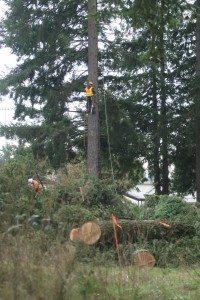Citizens file public records request for Mayor McGinn and DPD to disclose who is involved in drafting legislation to significantly reduce protection for trees in Seattle
On Friday, May 25, 2012 Save the Trees-Seattle filed public records requests with the Seattle Department of Planning and Development (DPD) and with the Office of the Mayor regarding their roles in implementing and carrying out the directives in Seattle City Council Resolution 31138 and to find out who else is involved.
Resolution 31138 passed August 3 2009 and requested “that the Department of Planning and Development (DPD) submit legislation by May 2010 to establish a comprehensive set of regulations and incentives to limit the removal of trees and promote the retention and addition of trees within the City of Seattle on both private and public property, including city park land. DPD shall consult with all city departments that own lands that will be affected by these regulations or incentives.”
However in response to this resolution DPD submitted a scoping document in 2011 that mostly ignored the issues and direction that the Seattle City Council asked to be considered. Instead they proposed dropping all existing regulations to protect significant trees and tree groves in Seattle. saying that all that was needed were incentives and education. This is contrary to the direction most other cities are moving.
The Seattle Urban Forestry Commission and tree advocates strongly objected to last year’s scoping document’s conclusions and the flawed public review process that DPD held. When asked, DPD’s representative on several occasions publicly stated that they did not have to tell the public where and when public meetings were being held where people could give input. They would not post on the city’s website the places and times publicly paid city workers were discussing the proposed ordinance. They then tried to claim that they sought public input.
Unlike Shoreline which last year conducted a public process to receive citizen input on their proposed tree ordinance and posted citizen comment on the website, DPD only “summarized” what input they received and did not release or post what citizens and others actually submitted. They did not as far as we could tell record most public comments at meetings we attended or have a form for people to respond to nor did they take notes of most comments. In other words we did not really see a public record being kept of public input.
A DPD representative who is the point person to the Urban Forestry Commission informed the Urban Forestry Commission earlier this month that DPD has now drafted a new proposed tree ordinance. This was news to the Urban Forestry Commission as none of them appeared to have been involved in reviewing or writing this new proposed ordinance even though there are many experts on the Urban Forestry Commission.
Who drafted this proposed ordinance which we are told will be released in July for public comment? The recent article in the Seattle Times entitled “Developer interests guide mayor Mayor’s growth proposals” seems to answer the question – Mayor McGinn’s shadow government which is operating out of the public eye. No one in the urban forestry and tree protection community was involved to our knowledge.
This secretive cabal of special interest adviser’s to McGinn is operating outside the public eye and without public scrutiny. Yet DPD’s Head – Diane Sugimura is involved and that probably explains how last year’s flawed tree protection proposal supposedly written by DPD and that represents the developer’s position and would have removed protection for most trees in Seattle and that opposed a tree permit system to remove trees, came to be the exact opposite of what the Seattle City Council requested. DPD’s proposal pushed for deregulation rather than protection for trees and Seattle’s urban forest.
There will always be differences of opinion on proposed legislation but a process that is a sham and shuts out the public, but listens to special interests, has no place in Seattle. It has no credibility. That is why we are seeking information so that the public knows who is driving this effort to deregulate tree protection in Seattle. We believe the City Council needs to remove the drafting of a new tree ordinance from DPD which has a conflict of interest in representing development interests and not tree protection. They get revenue from issuing building permits, not saving trees.
Seattle Public Utilities or the Office of Sustainability and the Environment would be better city Departments to propose draft legislation and oversee such legislation. Nine city Departments deal with tree issues. A combination of the Urban Forestry Commission, the Planning Commission and the Parks Commission would not have a conflict of interest in overseeing a public review process of proposed legislation. DPD did a terribly flawed process and is not to be trusted.
This flawed DPD faux public process is in danger of being repeated again. This is the wrong way to draft legislation. Seattle should look to Portland as an example where a public process involved public meetings conducted jointly by their Urban Forestry Commission and their Planning Commission and received strong public support.
Legislation crafted by special interests behind closed doors has no place in Seattle and needs to be rejected. It’s up to the City Council to step in to change this flawed process. DPD and their developer interests have a conflict of interest in drafting a tree protection ordinance and should not be in charge of doing so.



